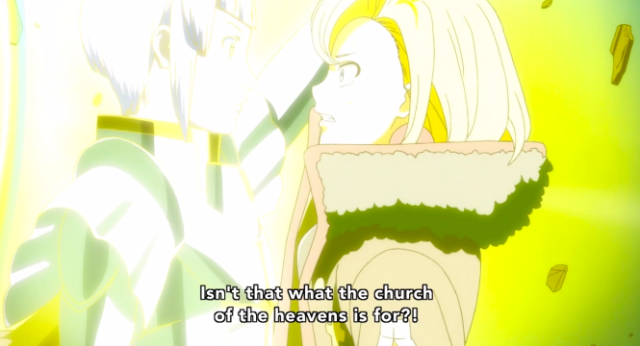I was initially suspicious of this series even though I liked their choice of the setting. Iblessall proves my suspicion that there might be anti-Church messages in it correct.
So, the headline here is that I’m dropping Junketsu no Maria and that I’m pretty bummed about doing so. I like, even adore, a lot of the peripheral elements of the show—Maria herself, her little posse of misfits, the character designs—but the show’s handling of Catholicism and the Catholic Church, which was more or less the focus of this episode, has left me both uncomfortable and a bit upset after watching the second episode. And, as much as I want to, I just can’t ignore those warning bells in my head.
View original post 2,235 more words

The article is informative regarding the series, although the parts regarding the Medieval period and the Church of that time fall into some stereotypes.
LikeLike
Well, if you’re talking about Church corruption, I know that the Medieval Church in France was particularly corrupt during that time. (Likely in other places too, but my memory seems deficient on this point.) But, what most people are quick to overlook is that most of the French at that time were corrupt–both ecclesiastics and lay persons. It is very hard to have good shepherds when one draws from a tainted flock! One of the reasons Mark Twain became so enamored of St. Joan of Arc was because she was an outstanding example of a true human being amid all that corruption.
But, it is a mistake to make the general comment that “the Medieval Church was corrupt.” One needs to consider the time, specific location, and just which persons were exhibiting corruption. For example, Protestants complained of Church corruption prior to the Reformation, and this corruption did enable the Protestants to succeed in the places where they did. However, that movement did not gain enough traction in France, Spain, Italy, Austria, and other places, which rather suggests that the priests and bishops of those areas were generally respectable–especially in Spain. Otherwise, the Protestant movement would have swayed great numbers of people in those countries too. (I suppose they did in France, but not the great majority.)
Be that as it may, making these distinctions might have diverted people from the excellent points iblessall made. I thought it an excellent article.
LikeLike
Not only that, but the general tone regarding the Medieval period.
Yes, the corruption was more specific to certain places, or times, like the Iron Century.
I think that making these distinctions would have improved the article, considering that it would have been a good opportunity to inform his audience about these topics, an audience that I guess is mostly composed of non Catholics.
LikeLike
Regardless of my numerous additional points of individual disagreement, I would have a lot more respect for iblessall’s work if this article had been written after the show had already concluded.
Instead, we get a very well-written blog post that reflects an honest emotional response on the author’s part, but basically takes the intellectual arsenal of modern Catholic theology and uses it to automatically disarm the partial representations of an opponent who has its hand tied behind its back the entire time and has barely even begun to speak.
It is not beyond reason that iblessall might well have spent all that time and effort attacking shadows. Even just after watching the third episode, I can already tell that iblessall’s article made a few assumptions that were not perfectly accurate and might be premature.
LikeLike
Thanks for your comment. It occasionally happens that a story seems to oppose a worldview only to validate it later. I’ll keep an eye out for posts about this show to see whether it continues with an anti-theistic story.
LikeLike